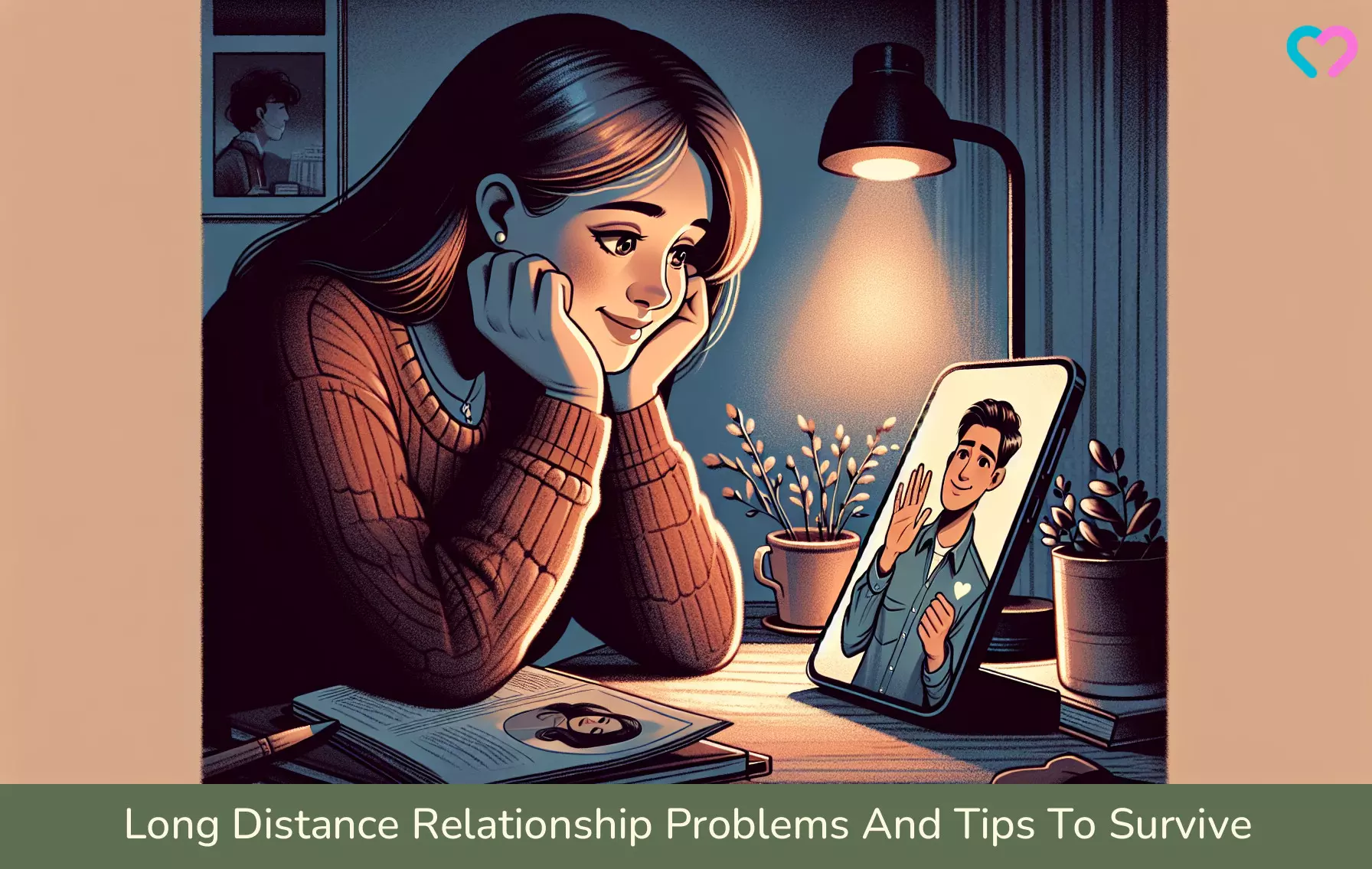
Image: Shutterstock
Distance does make the heart grow fonder, but it can also cause multiple issues between the partners in many situations. Long-distance relationship problems make the couples go through several ups and downs. If they can make it work even when they are apart, it simply shows a whole lot of emotional maturity, love, and respect towards each other. However, couples often may not be able to maintain their relationship even though they communicate regularly. It could be due to various problems, including the inability to fulfill expectations, lack of intimacy, or losing trust. So here we are to help you understand more about how long-distance relationships are, what could be the damaging reasons, and how to deal with them.

Key Pointers
- Maintaining conscious effort helps long-distance relationships work.
- Long-distance relationships can increase personal and relationship strength.
- Benefits of long-distance relationships include communication and independence.
- Challenges of long-distance relationships include trust and lack of physical support.
- Coping mechanisms for long-distance relationship issues include staying busy, honesty, and positivity.
Do Long-Distance Relationships Work?
Yes, a long distance relationship does work, provided the partners make a conscious effort to make it work.
- Ask yourself why you want to be in this relationship. The reason needs to be good and strong enough for you to make an effort.
- The partners need to understand and accept the reasons for having to stay apart. Your spouse could be away from you for a genuine reason — to pursue higher education, to better their career, or on duty.
- Try to get busy when your partner is away instead of staying home alone. You could pursue your education, a career, or a hobby.
- Deal with the loneliness whenever you miss your partner by being active socially, meeting up with friends, going for family get-togethers, and keeping yourself busy in other ways.
- Don’t let your relationship die a slow death with boring routines. Keep it alive by being romantic and funny. Whatever you do, stay connected and in love.
Above all, have a positive outlook.
Positive Sides Of Long Distance Relationships
You need to work hard to make a long-distance relationship work. And the hard work and effort you put in can reap great benefits in the long run. Here’s how distance can enhance your relationship:
- Absence makes the heart grow fonder: It may sound clichéd, but absence can make you love your partner more. When you are apart long enough, even a simple late night text from your loved one can give you a high like never before. And the wait seems to be worth it when you both are finally together.
- Communication becomes stronger: The survival of the LDR solely depends on communication. If you can convey your emotions and feelings with all honesty, you can strengthen your relationship. And all communication, no matter how small, becomes precious.
- You can have the best of both worlds: How often have you longed to do what you like doing, but had to compromise because you had to accommodate your partner’s interests? Well, now is the perfect time to watch that TV show without any whining in the background, laze on the couch without having to cook, and shop without being hurried. And when your partner is around, you get to spend some amazing time with them.
- Makes you strong as a person and great as a couple: When you are single, you fix the lights, change the flat tires, cook your own dinner, and do a zillion other things all alone. Living on your own makes you strong and independent. And that’s almost exactly what you do when you are in a long-distance relationship. It supports personal growth, allowing each partner to explore their interests and hobbies, which can strengthen the relationship.
But not all long-distance relationships can work, because of the common problems that couples fail to address.
 Quick fact
Quick factProblems In A Long Distance Relationship
With distance comes a host of problems that can put your relationship to the test. Keeping the relationship alive when you have these problems can be challenging.
- Lack of trust: Without trust, your LDR can fail. You begin to wonder if your partner is honest, loyal, and committed to you. And there is no way of knowing that when the person is miles apart.
- Misunderstandings: Simple issues can flare up into major conflict. For instance, when your calls are not answered immediately, you tend to get suspicious or feel that you are being ignored, while the reality could be something different. Misunderstandings creep into your relationship easily, for communication over phones and video calls is no match for talking in person.
- No physical support: You know they are there for you if you need them. But when you need their shoulder to cry on, a hand to hold, or a hug to soothe you, their absence becomes painful and frustrating. This might, in some cases, make the partners seek someone who’s closer and available in person.
- Envy and insecurity: You get jealous of your partner if they go clubbing or hang out with friends. And the jealousy is justified to an extent because you miss your partner and are not able to spend time with them, while others can. And then there is always the fear that your partner may be cheating on you or spending more time than required with friends from the opposite sex. The fear translates into insecurities.
- Fights lead to bitterness: In an LDR, there is this constant need to justify your actions and to prove yourself after every fight, which can lead to bitterness in the partners. Whitney & Megan Bacon-Evans, who maintained a long-distance relationship for four years, can attest to this challenge, as they share, “Ooh, we’ve had some big and bad ones, that’s for sure. The distance only makes them worse and prolonged when a hug would have solved the situation long before (i).” Conflict is a part of any relationship, but the distance makes it more difficult to address these issues.
- Sex life? Where is it? You keep craving physical intimacy with your partner. You may not necessarily think of sex. You could just want to hold hands or hug them, but they aren’t around for that. This need for and lack of physical intimacy could lead to looking for connection elsewhere.
- Fear of infidelity: As said earlier, the lack of physical intimacy could make the partners seek an emotional or physical connection outside of their relationship. This could further lead to emotional detachment from the current partner.
- Running out of conversations: It’s so easy to slip into boredom in the absence of lively conversations. If all you are doing is updating each other about your regular routines over the phone, the conversations will lack luster and eventually become sparse.
- Ambiguity about future: There’s perpetual ambiguity in your relationship status. The uncertainty in your relationship leaves you unsettled and affects the other areas of your life as well.
- Drift apart: Once the partners get used to leading separate lives, then that becomes routine and might gradually increase the gap in the relationship.
- Neglect other relationships: In some cases, you might get so obsessed about your partner that you ignore other relationships. You might begin to neglect your friends, children, and the extended family thinking about how your partner is and what they may be doing.
- Anxiety in the relationship: There’s underlying anxiety over several factors such as your partner crossing the boundaries, cheating on you, not being able to visit regularly, and so on.
- Depression seeps in: Long distance relationships are no fun. The constant absence of your partner can make you feel depressed and hopeless.
- Loneliness kills: You are away from the most important person, with whom you want to share your successes, fears, or laughs. You feel lonely when you see couples going arm-in-arm and enjoying the connection you long for. You may miss them more when they’re not around to share the little cute things your kids might say or do.
- Costly to maintain: Financial strain may cause the relationship to become burdensome. Whether it is the surprise visits, vacations, or gifts, all of them can prove to be expensive and go above your budget.
- Gaslighting: Gaslighting aggravates long-distance relationships, where individuals derive satisfaction from manipulating their significant others and engaging in a blame game. Those grappling with insecurities often employ it, aiming to keep their partners emotionally entangled in their thoughts.
- Stonewalling: Stonewalling represents a prevalent issue in long-distance relationships, and it can be frustrating for the person experiencing it. Imagine going days without any call or message from your significant other, where silence is used as escapism.
- Possessiveness: Possessiveness in a long-distance relationship can be a common challenge, and it often stems from feelings of insecurity, fear of loss, or a lack of trust.
A long-distance relationship can be tormenting.
You can’t merely sweep your feelings under the carpet and ignore them. Sleeping alone in your bed might only result in sleepless nights and make you wonder if all the pain is worth it.
You might hate your long-distance relationship, at times. But you still love and trust each other, and that’s the silver lining! It means LDRs have a bright side too.
Though there are many advantages to a long-distance relationship, surviving in such a relationship could be a struggle for some. But if you love your partner and want to make the relationship work, you should know how to steer through the tough situations thrown at you when you have to live away from your partner.
Pepperdine University surveyed 95 undergraduate students aged 18 to 25 to investigate whether long-distance relationships exhibit a higher or lower degree of intimacy than those not physically separated.
As depicted in the graph below, the results revealed no significant difference in the commitment, togetherness, and overall satisfaction reported by individuals in long-distance relationships compared to those in geographically close relationships.

Comparison of commitment, togetherness, and overall satisfaction between long-distance and geographically close relationships
Source: Distance Makes the Heart Grow Fonder: Do Long-Distance Relationships Have Relationships Have an Effect on Levels of Intimacy in Romantic Relationships? ; Pepperdine universityHow To Survive A Long Distance Relationship?
Being pragmatic and strong can help you face the challenges and survive the distance.
1. Don’t make quick judgments
When you are away from each other, communication is not always complete and can leave room for misunderstandings. You might get impatient when you are not in contact with them and make assumptions that aren’t facts. The key is to be patient and avoid reacting and judging your partner’s action or inaction. Otherwise, it won’t be long before your relationship suffers due to misplaced assumptions and judgments.
2. Plan accordingly
, a licensed professional counselor and couples relationship coach of Timko Counseling Services, says, “Be clear on where the boundaries of the relationship need to be so that each person can continue to feel safe. Also, talk about what the expectations that each of you have for the separation.
“Be fair to one another. If something changes, tell your partner as soon as you realize it. Don’t leave your partner to assume that everything is ok when it isn’t.”
“Establish some good habits. Identify times and places when you will connect regularly. Once you put those in place, follow them consistently so that the relationship develops some security. These might include regular check-ins, phone or video conversations, video dates, or visits to see one another.”
 Quick tip
Quick tip3. Don’t allow jealousy to seep in
Insecurity is one of the factors that can end a long-distance relationship. You might get jealous that your partner is spending more time with others than with you, even if for justifiable reasons. Try to understand their perspective and be mindful of your insecurities.
Otherwise, the feelings of discomfort and jealousy could create problems for your relationship. Trusting, instead of doubting your partner when you are in a vulnerable situation, could help your relationship succeed.
4. Strive to make the relationship work
Don’t take your long-distance relationship for granted. Learn how to spice up your long distance relationship and make an effort to keep things transparent, strengthen your bond, and let your significant other know that you are there for them at all times. You don’t have to chat or be on call a lot. But make it a point to tell them how much you love and appreciate them whenever you get a chance. This can also help you push aside petty disagreements and fights between you and your partner.
Time difference is one of the major reasons why LDRs become difficult for some couples. Rebecca Johnston, sex and relationship therapist and coach at Rostered Relationships, suggests setting up communication skills. “LDRs can be really challenging, particularly when schedules don’t align, and time zones are involved because it can make it difficult to find time to have real connection in conversation on a consistent basis.
“Pay attention to when conversations go really well, and when they don’t. When you reflect on different aspects that were in play – such as level of energy, food intake, and travel obligations. – try to find recurring patterns and then make changes where necessary to avoid foreseeable unsavory interactions.”
5. When in doubt, see your partner
You will go through various emotions as you may feel sad, angry, anxious, and lonely. Instead of dwelling over these feelings, take time to visit your partner. It might be a costly plan, but it will be worth it when you and your beloved are right in front of each other after a long time. Whatever anger or grief you were experiencing will disappear the moment you are together hopefully!
6. Look at the bigger picture
Usually, the arguments between a couple in a long-distance relationship are about petty things. And when not addressed, these minor issues could cause a rift in the relationship.
Every time you’re annoyed by a petty issue about the relationship, stop and look at the bigger picture. Ask yourself, “is it worth spending so much time and effort on this issue? Is it worth the fight?” How would I feel if my partner was bringing up the same issues about me? Answer these questions, and you’ll know how to make your relationship survive.
If the above tips aren’t helping, don’t worry. The next best option could be to take a break from your relationship, review what you really want from a relationship and consider your own values and goals.
 Point to consider
Point to considerDoes Taking A Break Help In A Long Distance Relationship Help?
“Time! The corrector when our judgments err.” –
Lord Byron
Taking a break when you are unable to resolve your problems could help by giving you time to think about and evaluate your past, present, and future with your partner. Taking a break doesn’t have to mean breaking up with your partner.It means staying away from one another for longer than usual, and not exchanging communication until both the partners are ready.
A break from the relationship can help you declutter your mind and come up with a clear answer.
That said, a break may not be the best idea when you are too angry or depressed, as these emotions can be unhelpful in your decision making. Don’t be impulsive, consider the pros and cons. Ask yourself and your partner these long-distance relationship questions before making a decision.
If you are thinking about taking a break from your long-distance relationship, talk to your partner first. If your partner thinks that the issue can be resolved by talking, then give it a chance. If they agree with your decision, then take a break on mutual terms.
Sometimes, the challenges of an LDR could make you want to end the relationship. If that is the case give enough thought to the idea before you decide. Don’t make decisions based on emotional responses, look at the whole picture.
How To End A Long Distance Relationship?
It is not so easy to break up with someone. But it may be the right thing to do when there is no happiness, future, or hope left in the relationship.
Sending them a text saying ‘it’s over’ or calling them to say it is easy. But not the right way to end a relationship. If you’ve made up your mind about ending the bond, here are a few points that you may try to make the task easy.
- Try to end the relationship in person. If you are a few hours from your partner, then try visiting them. Otherwise, a video call or phone conversation would do. An email, text, or message is not the ideal way to break up. Consider how you would feel if they did this to you.
- Find the right time to end. Don’t rush it. Choose the right time when both of you are free and not preoccupied with other things.
- Let them know you want to talk about something important. A heads up is necessary when your partner is not aware of your decision. Be careful when using your words. Don’t blame your partner or use any harsh words when you are ending your relationship.
- Try to be patient. If they are not expecting the news from you, they could be angry or upset and not accept your decision immediately. So, you need to be calm and patient to let them process the news and accept it in their own time. Breaking up can indeed be heartbreaking.
- Give your reasons and the option to agree with the break up. This will be easier on their ego and allow them to tell friends and family that it was a mutual decision, based on the circumstances, rather than making them feel like the victim, or ‘abandoned’ one in the relationship.
Frequently Asked Questions
1. When should I give up on my long-distance relationship?
These signs may indicate it’s time to give up on your long-distance relationship:
- Your relationship is not stable.
- You develop a feeling of isolation and the burden of carrying the relationship is solely on you.
- You are losing trust in your partner
- You don’t see a future with your partner.
- You have stopped growing in your relationship
2. Does love fade away in a long-distance relationship?
Being in love with each other does not necessarily require the presence of partners. True love thrives on commitment, trust, and respect. So, love does not fade away in a long-distance relationship if you know how to nurture it and communicate with your partner.
3. How often should I FaceTime in a long-distance relationship?
In a long-distance relationship, the frequency of FaceTiming or video calls may vary based on the preferences and schedules of the parties. Finding a balance that benefits both parties and fosters connection is generally a good idea.
4. How can I manage the financial costs of a long-distance relationship?
The financial management of a long-distance relationship calls for open communication, compromise, and striking a balance that benefits both parties. Together, regularly examine your financial situation and make necessary adjustments. You may efficiently handle financial expenditures by budgeting, being aware of spending, and leveraging technology to aid your communication through messaging and video calling apps.
5. What are the hardest months in a long-distance relationship?
Some commonly considered hardest months in a long-distance relationship include the beginning months as it requires the adjustment of being physically separated as the excitement of being apart can wane and the reality and loneliness of the distance sets in. Additionally, missing out on important milestones and special occasions like graduation, birthdays, and anniversaries makes it some of the hardest points in a long-distance relationship.
6. How often do most long-distance couples see each other?
Some long-distance couples can see each other every few weeks or once a month if they live close or can fly. Others may only visit every few months or fewer due to distance or other constraints. Some factors like distance, financial restraints, work or education responsibilities, and personal preferences can affect how often long-distance couples see each other.
These are the common long-distance relationship problems. Although it is challenging to keep the romance sizzling during a long-distance relationship, mutual love, respect, and trust could keep the couple bonded. In such relationships, you might have to think unconventionally to maintain the bond. If you and your partner have been facing issues due to the distance, discuss the cause of the issues and focus on resolving them. Plan a few surprise visits, spoil each other with gifts, and keep each other updated with each other’s daily activities. However, understand that the efforts should be mutual for the relationship to sail smoothly.
Infographic: What Problems Could Occur In A Long-Distance Relationship?
Despite platitudes like ‘Love knows no boundaries’ and ‘Distance doesn’t matter if you really love the person,’ long-distance couples have their own challenges. Therefore, it is important to identify and tackle potential problems to have a smooth relationship. The infographic below explains some of these problems a couple may face.
Some thing wrong with infographic shortcode. please verify shortcode syntaxIllustration: Long Distance Relationship Problems And Tips To Survive

Image: Dall·E/MomJunction Design Team
Maintaining a long-distance relationship is not easy. A couple faces many challenges to make it work. Let’s look at the common problems and learn some tips to solve them for a happy long-distance relationship.
Personal Experience: Source
MomJunction articles include first-hand experiences to provide you with better insights through real-life narratives. Here are the sources of personal accounts referenced in this article.
i. Long Distance Loving: The Good, The Bad, The Ugly;https://www.whatwegandidnext.com/2012/06/long-distance-loving-good-bad-ugly.html
Community Experiences
Join the conversation and become a part of our nurturing community! Share your stories, experiences, and insights to connect with fellow parents.
Read full bio of Emma Mathews
Read full bio of Shikha Thakur
Read full bio of Siddharth Kesiraju
Read full bio of Benidamika J Latam

















